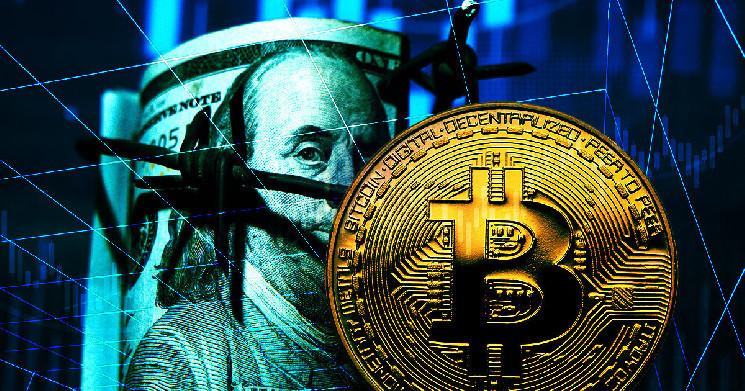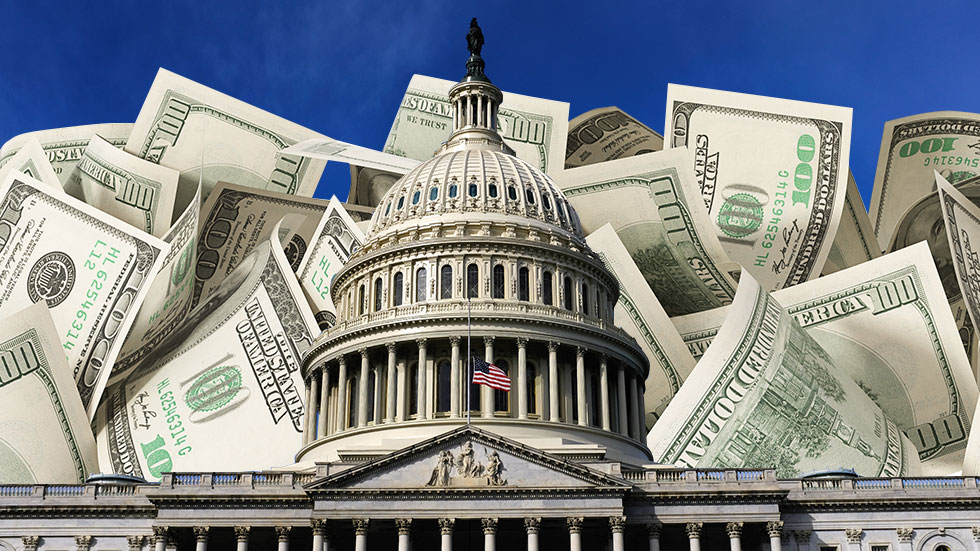The US debt ceiling crisis is a situation where the US government is at risk of defaulting on its obligations if Congress does not raise the legal limit on how much it can borrow. This could have serious consequences for the global economy and financial markets, as well as the US dollar.

Bitcoin, as a decentralized digital currency, is often seen as a hedge against inflation and currency devaluation. Some analysts believe that Bitcoin could benefit from a US default, as it would increase the demand for alternative assets and reduce the confidence in the US dollar.
However, others argue that Bitcoin could also suffer from a default, as it would trigger a sell-off in riskier assets and increase the volatility and uncertainty in the market.
According to some news sources, Bitcoin price has been rising in recent days amid optimism over a possible US debt ceiling deal. However, this could also be influenced by other factors, such as technical analysis, market sentiment, and supply and demand dynamics. Some experts suggest that Bitcoin could jump by $20,000 if a US default happens, while others warn that Bitcoin could dip by $5,000 initially before recovering.
Therefore, it is hard to predict how exactly the Bitcoin price will react to the US debt ceiling crisis, as it depends on many variables and scenarios. However, one thing is certain: Bitcoin price will likely experience more volatility and fluctuations as the deadline approaches.
What Is The US Debt Ceiling?
The US debt ceiling is the limit on the amount of money that the US government can borrow to pay for services, such as social security, Medicare, and the military. Each year, the government takes in revenue from taxes and other streams, such as customs duties, but ultimately spends more than it takes in.
This leaves the government with a deficit, which has ranged from $400bn to $3tn each year over the last decade. The deficit left at the end of the year ultimately gets tacked on to the country’s total debt.
To borrow money, the US treasury issues securities, like US government bonds, that it will eventually pay back with interest. Once the US government hits its debt limit, the treasury cannot issue more securities, essentially stopping a key flow of money into the federal government. Congress is in charge of setting the debt limit, which currently stands at $31.4tn. The debt ceiling has been raised or suspended 78 times since 1960, under both Democrat and Republican presidents.

If the US government does not raise or suspend the debt ceiling by June 1, 2023, it will risk defaulting on its obligations, which could have serious consequences for the global economy and financial markets, as well as the US dollar. The US has never defaulted on its payments before, so exactly what will happen is unclear.
However, some possible outcomes are: federal workers would be furloughed, global stock markets would crash, the US economy would drop into a recession, and investors would lose faith in the US dollar. Therefore, Congress must reach a deal to avoid this scenario.
What Happens If The US Defaults On Its Payments?
If the US defaults on its payments, it could have severe consequences for the global economy and financial markets, as well as the US dollar. Here are some of the possible outcomes of a US default:
- Interest rates would increase, as investors would demand higher returns for lending to the US government. This would make borrowing more expensive for the US government, businesses, and consumers, and could lead to higher inflation and lower economic growth.
- Stock markets would crash, as investors would lose confidence in the US economy and its ability to repay its debts. This would erode the wealth of millions of Americans and affect their spending and saving habits. It could also trigger a global financial crisis, as many countries and institutions hold US debt as a safe asset.
- Government programs like Social Security, Medicare, and the military would be impacted, as the US government would not have enough money to pay for its services and obligations. This could affect millions of Americans who rely on these programs for their income and health care. It could also undermine the national security and global leadership of the US.
- The US dollar would lose its status as the world’s reserve currency, as investors and central banks would seek alternative assets to store their wealth and conduct international trade. This would reduce the demand for the dollar and lower its value, making imports more expensive and hurting American consumers and businesses. It could also create instability in the global monetary system, as there is no clear alternative to the dollar.
How To Protect Investments From A Default
There is no definitive answer to how you can protect your investments from a US default, as different investors have different risk profiles, time horizons, and goals. However, some general tips are:
-
Expect volatility in bonds. Bond investors should expect volatility even during deal negotiations. If the US defaults, interest rates would increase, as investors would demand higher returns for lending to the US government. This would make borrowing more expensive for the US government, businesses, and consumers, and could lead to higher inflation and lower economic growth.
Bond prices move inversely to interest rates, so higher rates would mean lower bond prices. To reduce the risk of losing money, bond investors may want to stick with high-quality investments, such as US Treasuries or investment-grade corporate bonds, and avoid junk bonds or emerging market bonds. -
Stick with high-quality investments. Stock investors should also brace for volatility and uncertainty in the market. A US default could trigger a global financial crisis, as many countries and institutions hold US debt as a safe asset. This could erode the wealth of millions of Americans and affect their spending and saving habits. It could also undermine the confidence in the US economy and its ability to repay debts.
To protect their portfolios, stock investors may want to diversify their holdings across different sectors, regions, and asset classes, and focus on high-quality companies with strong balance sheets, cash flows, and earnings.

-
Adjust your 401(k) if needed. Retirement savers should not panic and sell their 401(k) assets in a hurry, as that could lock in losses and miss out on potential rebounds. However, they may want to review their asset allocation and rebalance their portfolio if needed. Depending on their age, risk tolerance, and retirement goals, they may want to adjust their exposure to stocks, bonds, and cash equivalents.
For example, younger savers may want to maintain a higher allocation to stocks for long-term growth, while older savers may want to shift more to bonds and cash for income and stability.
Buy Bitcoin Now
- Keep some cash on hand. Cash is king in times of crisis, as it provides liquidity and flexibility. Having some cash on hand can help cover emergency expenses or take advantage of market opportunities. However, holding too much cash can also be risky, as it could lose value due to inflation or currency devaluation. Therefore, cash savers may want to keep their cash in a safe place, such as a bank account or a money market fund, and avoid keeping large amounts of cash at home or in foreign currencies.
- Buy Cryptocurrencies. Cryptos such as Bitcoin are slowly maturing into haven assets offering investment alternatives during times of financial crisis. Analysts and investors expect that these digital assets will come in handy in case the United States defaults on its debt obligations.
These are some of the ways to protect your investments from a US default. However, you should also consult a financial advisor or planner before making any major changes to your portfolio or financial plan. They can help you assess your situation and provide personalized advice based on your goals and needs.